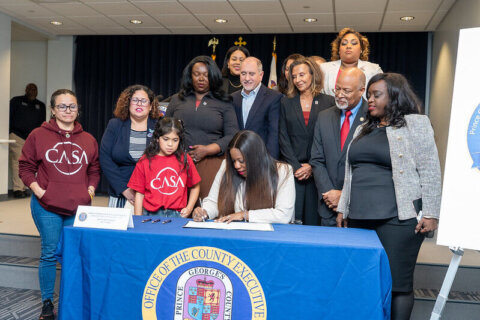Police reform measures passed by the State of Maryland last year are set to take effect July 1, and while some counties have created new accountability boards and processes, others are still working to get there.
In Prince George’s County, an expected vote by the county council was delayed Tuesday, after it became clear several council members weren’t comfortable with some parts of the legislation.
For nearly two hours, the council heard testimony from people frustrated by past efforts to hold bad police officers accountable, and suspicious that some of the reform measures under consideration won’t go far enough.
“We’ve heard the words ‘accountability’ and ‘transparency’ hundreds of times from those who are advocating for police reform,” said Dorothy Copp Elliott, whose son was killed by county and District Heights police officers in 1993. “Millions of dollars have been paid out recently because of lack of credibility and failure to follow the law.”
John Spillane said policing around the county is suffering from “a legitimacy crisis.”
Those who urged the council to do something also made clear they wanted the county council to make sure they get it right.
Under the county legislation that was being considered, the 11-member Police Accountability Board would be appointed by the county executive, subject to confirmation by the county council. That’s how most boards that operate in the county are staffed. But it’s a setup that the American Civil Liberties Union of Maryland urged the county council not to adopt.
The law passed by the state legislation simply says the board will be picked by the “governing body.” In Prince George’s County, that’s the county executive and the county council together, which means “you are not confined to doing it in this particular way,” said Colette Gresham, an attorney for the county council.
But even before Gresham offered that legal opinion, it was clear that the legislation being considered was likely to be changed, with a number of council members bringing several amendments to the table.
“Even during this process, my own amendments I want to amend,” said council member Jolene Ivey.
“I really appreciate my colleagues putting together some amendments that speak to who should be on these boards, how these boards should be funded, how these boards should be nominated, all those different pieces,” said council member Dannielle Glaros. ““I think all of us would concur that there are some amendments needed to ensure that we restore the trust in our community.”
The county council will come meet again on Monday with the hopes of finalizing the framework of the accountability board, so new systems are in place ahead of the July 1 deadline. However, county attorney Rhonda Weaver said “I don’t see an apparent penalty” for missing the deadline.








